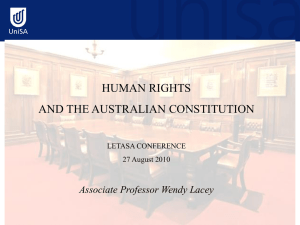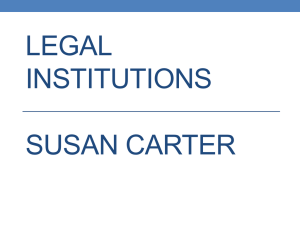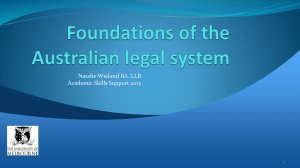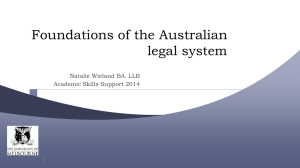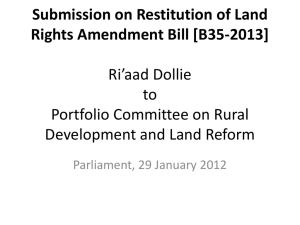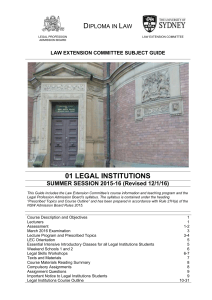Separation of Powers
advertisement
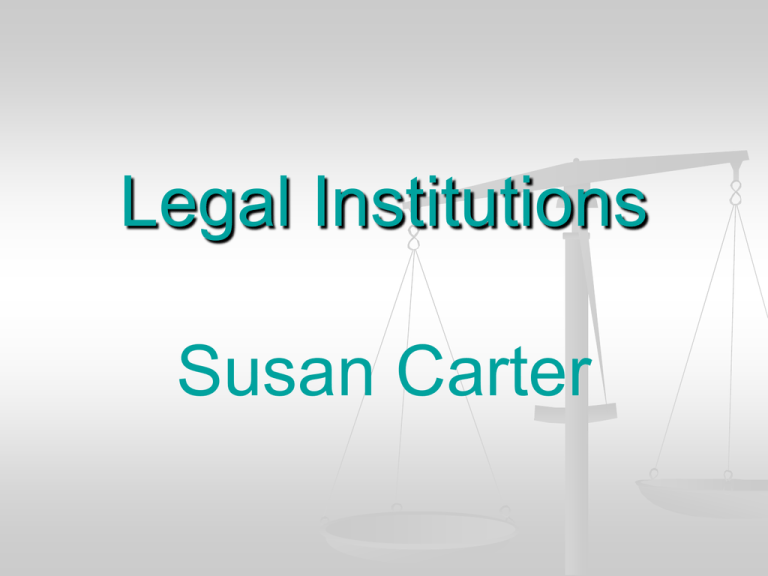
Legal Institutions Susan Carter Introductory matters Texts Materials Webcampus Slides Introductory weekend Contact: s.carter@sydney.edu.au Australian Legal Institutions Topic 3 Rule of Law “The doctrine of English law expounded by Dicey, in Law of the Constitution, that all men are equal before the law whether they are officials or not … so that the acts of officials in carrying out the behests of the executive government are cognizable by the ordinary courts and judged by the ordinary law, as including any special powers, privileges or exemptions attributed to the Crown by prerogative or statute. So far as offences are concerned, an offender will not be punished except for a breach of the ordinary law, and in the ordinary courts: there is here an absence of the exercise of arbitrary power. Further, the fundamental rights of the citizen; the freedom of the person, the freedom of speech and freedom of meeting or association, are rooted in the ordinary law, and not upon any special “constitutional guarantees.” Osborn’s Concise Law Dictionary Rule of law ‘Blind’ justice Scales and sword of justice Legal Institutions The institutions which enforce and uphold this rule of law in Australia are: Parliament: which makes the laws The Executive: which administers the laws, and The Judiciary: which declares the law, and what the rights of the individual are under the law. Separation of Powers English Civil War 1642-1651 Separation of powers Montesquieu 1689-1755 The Spirit of the Laws Geneva 1748 Australia: Federal System Parliamentary Education Office (www.peo.gov.au) Parliament 1. 2. 3. The Queen – as represented by the Governor-General or Governor The Upper House – Senate or Legislative Council The Lower House – House of Representatives or Legislative Assembly The Queen: Constitutional Monarchy Bi-cameral legislature Two houses of Parliament Except Queensland Same as UK The UK Parliamentary model: bicameral legislature + the sovereign House of Lords Queen Elizabeth II House of Commons New South Wales parliament Legislative Council NSW Governor Marie Bashir Legislative Assembly S3 NSW Constitution Commonwealth parliament House of Representatives Senate Governor General Quentin Bryce S1 Constitution Parliamentary power Parliamentary power in a Federal system Constitutional Conventions How many Parliaments? S51 Commonwealth Constitution s51: Powers of Parliament 51.The Parliament shall, subject to this Constitution, have power to make laws for the peace, order, and good government of the Commonwealth with respect to: (i.) Trade and commerce with other countries, and among the States: (ii.) Taxation; but so as not to discriminate between States or parts of States: (iii.) Bounties on the production or export of goods, but so that such bounties shall be uniform throughout the Commonwealth: (iv.) Borrowing money on the public credit of the Commonwealth: (v.) Postal, telegraphic, telephonic, and other like services: (vi.) The naval and military defence of the Commonwealth and of the several States, and the control of the forces to execute and maintain the laws of the Commonwealth .(vii.) Lighthouses, lightships, beacons and buoys: (viii.) Astronomical and meteorological observations: (ix.) Quarantine: (x.) Fisheries in Australian waters beyond territorial limits: (xi.) Census and statistics: (xii.) Currency, coinage, and legal tender: (xiii.) Banking, other than State banking; … (xiv.) Insurance, other than State insurance; also State insurance extending beyond the limits of the State concerned: (xv.) Weights and measures: (xvi.) Bills of exchanging and promissory notes: (xvii.) Bankruptcy and insolvency: (xviii.) Copyrights, patents of inventions and designs, and trade marks: (xix.) Naturalisation and aliens: (xx.) Foreign corporations, and trading or financial corporations formed within the limits of the Commonwealth: (xxi.) Marriage: (xxii.) Divorce and matrimonial causes; and in relation thereto, parental rights, and the custody and guardianship of infants: (xxiii.) Invalid and old-age pensions: (xxiiiA.) The provision of maternity allowances, widows' pensions, child endowment, unemployment, pharmaceutical, sickness and hospital benefits, medical and dental services (but not so as to authorise any form of civil conscription), benefits to students and family allowances: (xxiv.) The service and execution throughout the Commonwealth of the civil and criminal process and the judgments of the courts of the States: (xxv.) The recognition throughout the Commonwealth of the laws, the public Acts and records, and the judicial proceedings of the States: (xxvi.) The people of any race, for whom it is deemed necessary to make special laws (xxvii.) Immigration and emigration: (xxviii.) The influx of criminals: (xxix.) External Affairs: (xxx.) The relations of the Commonwealth with the islands of the Pacific: (xxxi.) The acquisition of property on just terms from any State or person for any purpose in respect of which the Parliament has power to make laws: (xxxii.) The control of railways with respect to transport for the naval and military purposes of the Commonwealth: (xxxiii.) The acquisition, with the consent of a State, of any railways of the State on terms arranged between the Commonwealth and the State: (xxxiv.) Railway construction and extension in any State with the consent of that State: (xxxv.) Conciliation and arbitration for the prevention and settlement of industrial disputes extending beyond the limits of any one State: (xxxvi.) Matters in respect of which this Constitution makes provision until the Parliament otherwise provides: (xxxvii.) Matters referred to the Parliament of the Commonwealth by the Parliament or Parliaments of any State or States, but so that the law shall extend only to States by whose Parliaments the matter is referred, or which afterwards adopt the law: (xxxviii.) The exercise within the Commonwealth, at the request or with the concurrence of the Parliaments of all the States directly concerned, of any power which can at the establishment of this Constitution be exercised only by the Parliament of the United Kingdom or by the Federal Council of Australasia: (xxxix.) Matters incidental to the execution of any power vested by this Constitution in the Parliament or in either House thereof, or in the Government of the Commonwealth, or in the Federal Judicature, or in any department or officer of the Commonwealth. States/Territories Northern Territory Australian Capital Territory Source of power Constitution section 122 Government of territories The Parliament may make laws for the government of any territory … and may allow the representation of such territory in either House of the Parliament to the extent and on the terms which it thinks fit. Separation of Powers Parliamentary Education Office (www.peo.gov.au) Westminster system (Responsible government) Westminster system: responsible government The Prime Minister... Is a member of Parliament • The member for Warringah Is the leader of the Government • Sits on the front bench in Parliament Is the leader of the Executive • Leads Cabinet – composed of the Ministers U.S. Constitution Separation of powers/responsible government Separation of Powers Courts in a Federal System Law Courts Building Queens Square Sydney Federal Court of Australia NSW Supreme Court NSW Judicial Hierarchy SUPREME COURT ACT 1970 – s 43 43 Sittings (1) Any 3 or more Judges of Appeal constitute the Court of Appeal. Federal Judicial Hierarchy Australian court hierarchy 34 Jurisdiction Original/appellate Civil/Criminal participants processes court orders party/parties/ litigants hearing judgment for … plaintiff v defendant applicant v respondent bring an action institute proceedings application/appeal allowed/dismissed appellant v respondent pleadings damages corporations statement of claim/writ/summons specific performance judges / magistrates defence injunction counsel/ QC/SC counterclaim declaration barristers appeal costs solicitors testimony pecuniary penalty http://www.supremecourt.lawlink.nsw.gov .au/supremecourt/sco2_what_to_expect/w hos_who.html Source of power? Constitution Constitution A constitution is an expression of the political will of the people, a statement, or an agreement, as to how the people are to be governed, by whom, and with what responsibilities. A constitution is a document, or a group of documents, laws or conventions, which outline the system of government for that state. Australian Parliament House Constitution may be: Unwritten, resting mainly on custom or convention; Written, in a formal legal form; Flexible, capable of being amended by ordinary legislative enactment; or Rigid (or entrenched), capable of being altered only by a special procedure – such as a referendum. William Charles Wentworth Federation process http://www.naa.gov.au/collection/explore/federation/constitution-website/index.html US Bill of Rights CONSTITUTION OF THE PEOPLE'S REPUBLIC OF CHINA Article 4. All nationalities in the People's Republic of China are equal. The state protects the lawful rights and interests of the minority nationalities and upholds and develops the relationship of equality, unity and mutual assistance among all of China's nationalities. Discrimination against and oppression of any nationality are prohibited; any acts that undermine the unity of the nationalities or instigate their secession are prohibited. The state helps the areas inhabited by minority nationalities speed up their economic and cultural development in accordance with the peculiarities and needs of the different minority nationalities. Regional autonomy is practised in areas where people of minority nationalities live in compact communities; in these areas organs of selfgovernment are established for the exercise of the right of autonomy. All the national autonomous areas are inalienable parts of the People's Republic of China. The people of all nationalities have the freedom to use and develop their own spoken and written languages, and to preserve or reform their own ways and customs. Article 35. Citizens of the People's Republic of China enjoy freedom of speech, of the press, of assembly, of association, of procession and of demonstration. Article 36. Citizens of the People's Republic of China enjoy freedom of religious belief. No state organ, public organization or individual may compel citizens to believe in, or not to believe in, any religion; nor may they discriminate against citizens who believe in, or do not believe in, any religion. The state protects normal religious activities. No one may make use of religion to engage in activities that disrupt public order, impair the health of citizens or interfere with the educational system of the state. Religious bodies and religious affairs are not subject to any foreign domination. Personal rights in the Australian Constitution s41: Right to vote s51(xxxi): acquisition of property on just terms Minister of State for the Army v Dalziel (1944) 68 CLR 261 s80: Trial by jury R v Pearson; Ex parte Sipka (1983) 152 CLR 254 R v Archdall (1928) 41 CLR 128 s116: Freedom of religion Krygger v Williams (1912) 15 CLR 366 s117:Equal treatment of state residents s92: Freedom of interstate trade Davies and Jones v State of Western Australia (1904) 2 CLR 29 Street v Queensland Bar Association (1989) 168 CLR 461 Bank Nationalisation case (Bank of NSW v Commonwealth (1948 76 CLR 1) Cole v Whitfield [1988] HCA 18 Implied rights Australian Capital Television Pty Ltd v Commonwealth (1992)177 CLR 106 Leeth v Commonwealth (1992) 174 CLR 455).
